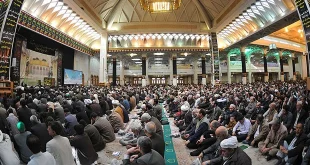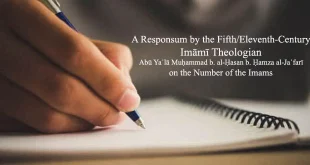This is a very popular discussion, and the famous opinion is that it is ḥarām to eat or drink on a mā’idah or a sufrah – which is essentially anything upon which you place food for consumption – while there is alcohol being consumed on...
Read More »The Bases for the Formation and Growth of Shīʼism from the Past to the Present in Indonesia
This article seeks to examine the contexts of Shiite growth from the past to the present. The author has studied and researched mainly this issue in the field and by analysing his findings in this country, he has proved the major effects of the....
Read More »Fatima al-Zahra, The World’s Most Outstanding Lady
Intermediary for earthly and heavenly creation wise one, daughter of the Prophet (spirit of beauty between the two), and the worthy wife of the saint of Allah, Hazrat Ali (a.s). Fatimah (s.a,) unparalleled heroin and unequalled herald throughout the history of Islam and...
Read More »Prophet’s Marriage to ‘Āyisha, A Hadith that Become a Reason for Islamophobia
The subject of my thesis was the famous and controversial hadith about the Islamic prophet Muḥammad’s marriage to his wife ʿĀʾišah bt. ʾabī Bakr at a young age: according to the dominant version of the hadith, she was six or seven at the time of her marital engagement, and nine at the time of her....
Read More »Ph.D. Thesis: The Lived Experience of Muslim Women Subjected to Islamophobia
This study explores the subjective experience of five Muslim women who wear or wore hijab in the past, and faced Islamophobia, using psychoanalytic case study methodology....
Read More »Twelver Shī‘īsm and Answering Shī‘ī Reformists
As societies have meandered through different epochs, expansions and ideas, it has only been natural for existing notions and ideas to be challenged, and this is a necessary and natural part of...
Read More »Contradictions of Civil Law with Islamic Law and its Implication on a Muslim’s Responsibility
This paper aims to understand the implications of civil law on a Muslim’s responsibility resulting from contradictions between civil law and Islamic law. The research uses the...
Read More »Between Qum and Qayrawān: Unearthing Early Shī‘ī Ḥadı̄th Sources
In this article, I develop and test a new methodology of unearthing early Shī‘ī ḥadı̄th sources that served as the basis for the later collections of the fourth/tenth century. This method, besides answering the question of historicity, enables us to understand the dissemination of...
Read More »A Responsum by the Fifth/Eleventh-Century Imāmī Theologian Abū Yaʿlā Muḥammad b. al-Ḥasan b. Ḥamza al-Jaʿfarī on the Number of the Imams
The present study discusses the scarce available data about Abū Yaʿlā al-Jaʿfarī and shows that he, rather than al-Murtaḍā, is the author of the tract, which circulated under titles such as Risālat al-ḥujja fī l-imāma and Masʾala fī bayān imāmat al-aʾimma al-ithnay ʿashar....
Read More »Unity of Muslim Ummah, It’s Need, Importance and Suggestions
No doubt unity and consensus has a miraculous role in developing a nation and achieving their higher goals. Muslim's unity is a major and undeniable problem of the time. The increasing sectarian ethnocentrism has spattered and blemished the fundamental Islamic...
Read More » Ijtihad Network Being Wise and Faithful Muslim in the Contemporary World
Ijtihad Network Being Wise and Faithful Muslim in the Contemporary World









